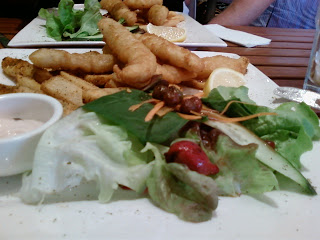In a typical week, the only seafood I am likely to eat is some canned tuna or a fresh piece of salmon, maybe a different fresh fish if something else looks good at the markets. If I lived at the coast that might be different though. I'm very careful to avoid species that I know are being unsustainably harvested, such as orange roughy. I know that salmon and tuna aren't perfectly managed either, but I've generally considered them to be better fish to eat from a conservation perspective. But this week I've read several things that have made me think I may be wrong. Perhaps I should give up on fish altogether? Here are some things to think about:
1) On Southern Fried Science, a really interesting post about why "Dolphin friendly" tuna might not be very friendly to anything else apart from dolphins - so maybe I should cut back on the tuna after all?
2) But maybe there is some hope? Tuna fisheries are also notoriously unkind to albatross populations, especially long-line fisheries. The birds try to eat the bait, get caught in the hooks and drown. I have always felt some guilt for these unseen deaths when eating my tuna mayonnaise. Then today I read on The Great Beyond that albatrosses may be saved after all. Changing practices have lead to an 85% decrease in the number of albatrosses killed by the fisheries. This can only be good news, surely?
3) I've also found another reason to worry about eating salmon. BBC Wildlife Magazine has an article in the February 2009 issue (page 39) describing a decline in salmon numbers in British Columbia. Fewer salmon means less food for grizzly bears for starters. So why are the salmon declining? The article points the finger at overfishing and the effects of fish farms on wild fish: sea lice breed in the farms then move out to infect wild fish. The salmon I get all comes from Aussie waters, mostly Tasmanian, but even though there are no bears to go hungry I'm sure the farms have the same problems. Perhaps I shall rethink salmon too?
I think I might just have to fork out a few dollars and get myself a copy of the Australian Marine Conservation Society's Sustainable Seafood Guide. At least then I'll have a better idea where I stand.
Finally, to end this post on marine life, I loved reading about this in the Telegraph: a biologist on a tagging trip caught a huge stingray, 7 foot by 7 foot!!!
